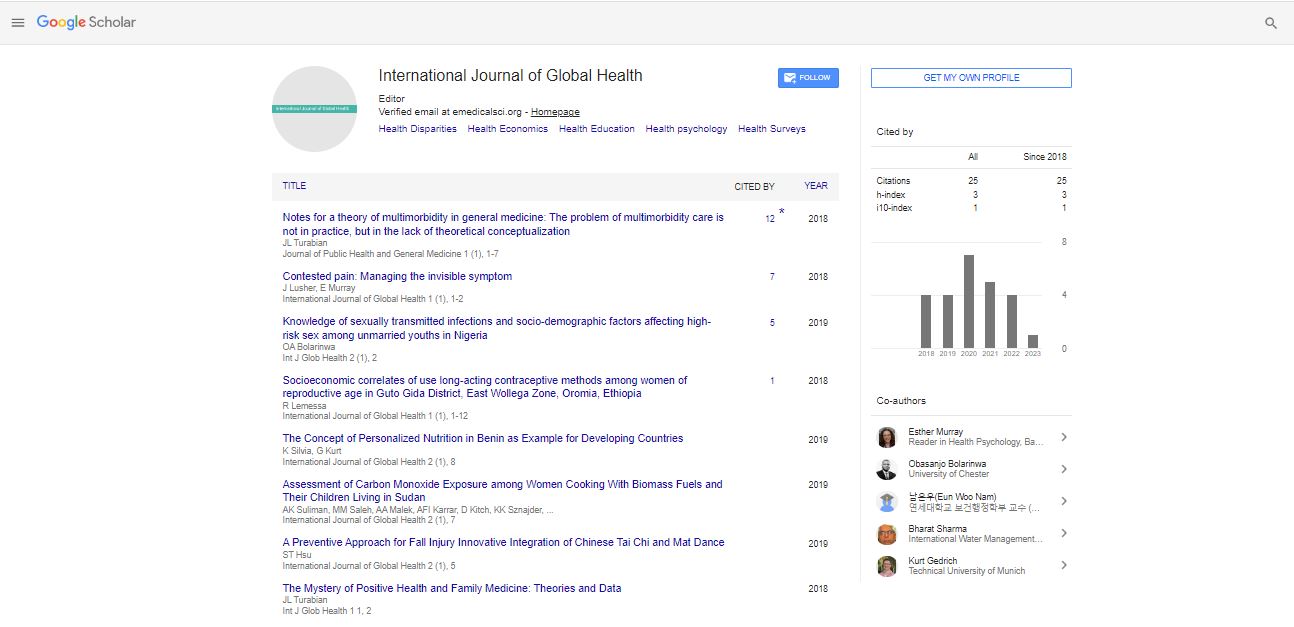Perspective, Int J Glob Health Vol: 6 Issue: 1
Health Psychology: Enhancing Well-being through Mind-Body Connection
Evelyne Biloria*
Department of Health Care, University of New South Wales, Kensington, Australia
*Corresponding Author: Evelyne Biloria
Department of Health Care
University of New South Wales
Kensington, Australia
Email: biloriaevelyne@gmail.com
Received date: 21 February, 2023, Manuscript No. IJGH-23-96057;
Editor assigned date: 23 February, 2023, PreQC No. IJGH-23-96057 (PQ);
Reviewed date: 09 March, 2023, QC No. IJGH-23-96057;
Revised date: 16 March, 2023, Manuscript No. IJGH-23-96057 (R);
Published date: 23 March, 2023, DOI: 10.4172/Ijgh.1000173
Citation: Biloria E (2023) Health Psychology: Enhancing Well-being through Mind-Body Connection. Int J Glob Health 6:1.
Description
Health psychology is a subfield of psychology that focuses on the interactions between psychological processes and physical health. It explores how psychological factors such as thoughts, emotions, behaviors, and social context can impact health and well-being. In this article, we will delve deeper into the world of health psychology, discussing its importance, key concepts, and how it can be applied to enhance overall well-being.
Key concepts of health psychology
Health belief model: The Health Belief Model is a widely recognized theory in health psychology that explains how individuals perceive and respond to health-related information. According to this model, an individual's perception of the severity and susceptibility of a health problem, the benefits and barriers of taking preventive actions, and cues to action, such as reminders or advice from healthcare providers, influence their decision to adopt health-promoting behaviors.
Stress and coping: Stress plays a significant role in health and well-being. Health psychologists study the impact of stress on the body and mind, and how individuals cope with stress. Coping strategies, such as problem-solving, social support, and emotion regulation, can influence the outcomes of stress on health. Chronic stress can lead to various health issues, including cardiovascular diseases, immune system dysfunction, and mental health disorders. Understanding effective coping mechanisms can help individuals better manage stress and improve their overall health.
Behavioral factors: Health psychologists also examine how behaviors, such as diet, physical activity, substance use, and sleep, affect health outcomes. Unhealthy behaviors can contribute to the development of chronic diseases, while healthy behaviors can promote physical and mental well-being. Health psychologists use behavior change theories and interventions to promote healthy behaviors and reduce risky behaviors. Motivating individuals to adopt healthy behaviors is a key focus of health psychology to prevent and manage health problems.
Psychosocial factors: Psychosocial factors, such as social support, relationships, and cultural influences, also play an important role in health and well-being. Social support has been shown to have a positive impact on physical and mental health, as it can reduce stress, improve coping skills, and enhance overall well-being. Health psychologists also explore how cultural beliefs and practices influence health behaviors and outcomes. Understanding the role of psychosocial factors in health can help in developing culturally appropriate interventions to promote health and well-being.
Biopsychosocial model: The biopsychosocial model is a holistic approach to understanding health and illness, which takes into account the interplay between biological, psychological, and social factors. It suggests that health and illness are influenced by complex interactions among biological, psychological, and social determinants, and cannot be fully understood by focusing on a single factor alone. Health psychologists often use the biopsychosocial model as a framework to guide their research and interventions, recognizing the interconnectedness of various factors in influencing health outcomes.
Applications of health psychology
Health promotion and disease prevention: One of the key applications of health psychology is in health promotion and disease prevention. Health psychologists work in collaboration with healthcare providers to develop interventions aimed at promoting healthy behaviors, such as smoking cessation, increasing physical activity, improving diet, and promoting safe sex practices. These interventions often use behavior change techniques, such as goal-setting, self- monitoring, and motivational interviewing, to help individuals adopt and maintain healthy behaviors.
Chronic illness management: Health psychology also plays a crucial role in the management of chronic illnesses. Health psychologists work with individuals who are living with chronic illnesses, such as diabetes, cancer, and cardiovascular diseases, to help them manage their condition and improve their quality of life. They provide support in coping with the emotional and psychological challenges of living with chronic illness, managing symptoms, adhering to treatment plans, and making necessary lifestyle changes.
 Spanish
Spanish  Chinese
Chinese  Russian
Russian  German
German  French
French  Japanese
Japanese  Portuguese
Portuguese  Hindi
Hindi 
